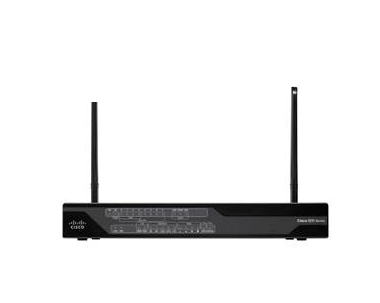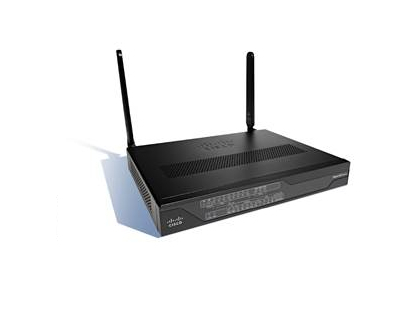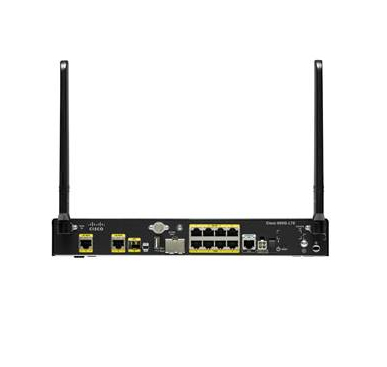
CISCO Cisco 890 Series Isr Secure Ge And Sfp Routerlte / Hspa+ With Sms/ Gps
The Cisco 880G and 890G Series 4G LTE 2.0 Integrated Services Routers with Cisco IOS Software offer support for integrated fourth-generation (4G LTE) wireless WAN (mobile broadband backhaul) and cutting-edge capabilities. The Cisco 880G and 890G Series ISRs provide a rapidly deployable, highly available, reliable, and secure solution designed to combine Internet access, comprehensive security, and wireless services in a single device that is easy to deploy and manage for primary or backup connectivity. Customers that would benefit from these routers include small businesses, remote small or medium-sized or power branches, financial services firms, healthcare organizations, pop-up stores, point-of-sale systems, and retail businesses. Fully integrated with Cisco IOS Software, the Cisco 880G and 890G routers deliver enterprise-class features, including highly secure data, voice, and video communications to stationary and mobile network nodes across wired and wireless links. The best-in-class Cisco 880G and 890G Series architecture is specifically designed to deliver high performance with concurrent services, business continuity, and investment protection. The Cisco 880G and 890G 4G LTE 2.0 series are the industry leader to bring enterprise grade wireline like functionality such as Quality of Service (QoS) for cellular, Multi-Virtual Route Forwarding (Multi-VRF), advanced VPN, and Unified Communications solutions over LTE.
The Cisco 880G and 890G Series LTE 2.0 routers also provide the ability to extend Cisco product-based networks to remote power branch offices with a relatively low incremental investment, as well as to enable managed services offerings based on end-to-end Cisco system architecture.
The Cisco 880G and 890G Series 4G LTE 2.0 ISRs are fixed-configuration routers that provide collaborative business solutions for secure voice and data communications to enterprise small branch offices, with support for the latest Third-Generation Partnership Project (3GPP) Release 9 standards for 4G LTE. They provide persistent, reliable LTE connectivity with fallback and transparent handoff to earlier technologies. The routers are designed to deliver secure broadband, Metro Ethernet or any xDSL variants, wireless WAN (WWAN) connectivity, and business continuity. They also come with powerful management tools, such as the web-based Cisco Configuration Professional configuration management tool, which simplifies setup and deployment.
- Cisco 4G LTE 2.0: Multimode LTE 2.0 for carriers that operate LTE 800-MHz (band 20), 900-MHz (band 8), 1800-MHz (band 3), 2100-MHz (band 1), or 2600-MHz (band 7) networks; the multimode 880G and 890G Series 4G LTE 2.0 routers are backward-compatible with Universal Mobile Telecommunications Service (UMTS) and High-Speed Packet Access Plus (HSPA+): 850 MHz (band 5) , 900 MHz (band 8), 1900 MHz (band 2), and 2100 MHz (band 1)
- C899G-LTE-NA-K9: Multimode Cisco LTE 2.0 for carriers that operate LTE 700 MHz (band 17), 1900 MHz (band 2 PCS), 850 MHz (band 5) or 1700/2100 MHz (band 4 AWS) networks; backward-compatible with UMTS and HSPA+: 850 MHz (band 5), 900 MHz (band 8), 1900 MHz (band 2 PCS), and 1700/2100 MHz (band 4 AWS).
- C899G-LTE-VZ-K9 and C899G-LTE-ST-K9: Multimode Cisco LTE 2.0 for carriers that operate LTE 700 MHz (band 13), 1700/2100 MHz (band 4 AWS), or 1900 MHz (band 25 extended PCS) networks; backward-compatible with EVDO Rev A/CDMA 1x BC0, BC1, BC10.
- C899G-LTE-JP-K9: Multimode Cisco LTE 2.0 for carriers that operate LTE 800 MHz (band 19), 1500 MHz (band 21), and 2100 MHz (band 1) networks; backward-compatible with UMTS and HSPA+: 850 MHz (band 5), 800 MHz (band 6), 800 MHz (band 19), and 2100 MHz (band 1).
The Cisco 880G and 890G Series 4G LTE 2.0 ISRs provide a broad range of enterprise-class features, including:
- Security services, such as firewall, intrusion prevention, VPN, and Cisco ISR Web Security with Cisco ScanSafe, which require no additional hardware or client software, This enables branch offices, manufacturing sites, hospitals, banks, and mobile fleets, for example, to intelligently redirect web traffic to the cloud to enforce granular security and acceptable use policies over user web traffic. With this solution, you can deploy market-leading web security quickly and easily to protect branch-office users from web-based threats, such as viruses, while saving bandwidth, money, and resources.
- Cisco WAN optimization system, consisting of Cisco Wide Area Application Services (WAAS) Express routers and Wide-Area Application Engines (WAEs) that work together to optimize TCP traffic in your network. When client and server applications attempt to communicate with each other, the network intercepts the traffic and acts on behalf of the client application and the destination server.
- Additional WAN options, such as Gigabit Ethernet WAN interfaces and an 8-port 10/100/1000 Gigabit Ethernet managed switch for LAN connectivity. The Cisco 880G and 890G Series ISRs provide quality-of-service (QoS) features for optimizing voice and video applications.
- Cisco Configuration Professional, a web-based configuration tool that simplifies setup and deployment. Centralized management capabilities give network managers visibility into and control over the network configurations at remote sites.
- WWAN services, offering enhanced data rates and improved latency (30 ms or less)—an ideal way to supplement traditional wireline services. The 4G LTE WWAN data services offered today have average data rates well in excess of ISDN speeds, with theoretical limits of 100 Mbps on the downlink and 50 Mbps on the uplink. The actual data speed depends on the service provider’s network. With 4G LTE data rates, the Cisco 4G LTE 2.0 WWAN offers a primary WAN link solution capable of running comprehensive branch-office services, including voice and video services. The 4G LTE WWAN data services can also be used as a cost-effective alternative in areas where broadband services are either not available or very expensive. Cisco is building on these performance milestones and adding support for wireless to our wide variety of WAN interface alternatives.
Business Benefits and Application Examples
Businesses are looking for ways to reduce costs, increase revenue, and improve business continuity. The 4G LTE wireless connectivity, which is 10 to 15 times faster and has 5 times lower latency than 3G links, allows a small enterprise branch office or remote office to set up comprehensive media services in a matter of hours, without worrying about availability of broadband services or the need to lay down the lines. Wireless carriers offer flexible, usage-based data plans that can be customized to meet the needs and price points of the business customer. As WAN backup alternatives, 3G and 4G LTE wireless offer greater WAN diversity and resiliency because they are independent of the local terrestrial infrastructure. The Cisco 880G and 890G help businesses stay productive during service provider downtime or a network failure with Cisco Intelligent WAN diversity and Cisco Application Visibility & Control (IWAN & AVC LTE support with C890 series).
Ability to Host Networks in Motion
The Cisco 880G and 890G use standards-based mobile IP features in Cisco IOS Software to host networks in motion. Transitions to different wireless networks are transparent to the users and devices (such as laptops, smart devices, and surveillance cameras), and applications maintain continuous connectivity without the user’s manual intervention as WAN links change. In addition to allowing a single node or device to stay connected, the Cisco 880G and 890G allow an entire mobile network or subnet to stay connected.
Retail VPN
Retail stores migrating from dialup connections for point-of-sale transactions can use the 4G LTE WWAN option on the Cisco 880G or 890G for low-cost broadband access, with the security required to comply with payment card industry (PCI) and other data security requirements. Multiple devices and applications can then be added to the store network to take advantage of the increased bandwidth and to enable secure mobility and enhance productivity.
Managed Services
Service providers and value-added resellers (VARs) can use the Cisco 880G or 890G as a platform to offer differentiated business-class security services for small and medium-sized business (SMB) customers. Superior management capabilities, such as Simple Network Management Protocol (SNMP) support for 3G MIB with 4G MIB extension and Cisco Configuration Professional, make remote management and provisioning easier.
- Multiple-PDN: This feature allows configuration of multiple active (Access Point Name) APN so that Internet traffic can be kept separate from the corporate traffic.
- 4G LTE multiple-bearer QoS for cellular: The Cisco 880G and 890G 4G LTE 2.0 supports 4G LTE multiple-bearer QoS. Detailed information on the bearer is part of show CLI, SNMP-MIBs etc. The QoS feature is service provider (SP) dependent, and requires SP to launch this service.
- Multi-VRF for cellular: 4G LTE 2.0 now support Multi-VRF for cellular network. Multi-VRF is a Cisco proprietary implementation over and above the 3GPP spec and requires Cisco ASR5K Packet Gateway (P-GW) as the head-end at the service provider’s network. The Multi-VRF feature is service provider (SP) dependent, and requires SP to launch this service.
- Enterprise grade Unified Communication solutions over LTE: The Cisco 880G and 890G 4G LTE 2.0 supports voice and video and can be integrated with Cisco Unified Communications cloud or premises-based infrastructure.
- Public Land Mobile Network (PLMN Search): UE presents end user with available PLMN search manually. UE can optimize PLMN search procedure using stored information such as RF carriers and cell parameters.
Results 0
- Reviews
- Write Review
- Questions and Answers
- Ask Question
















